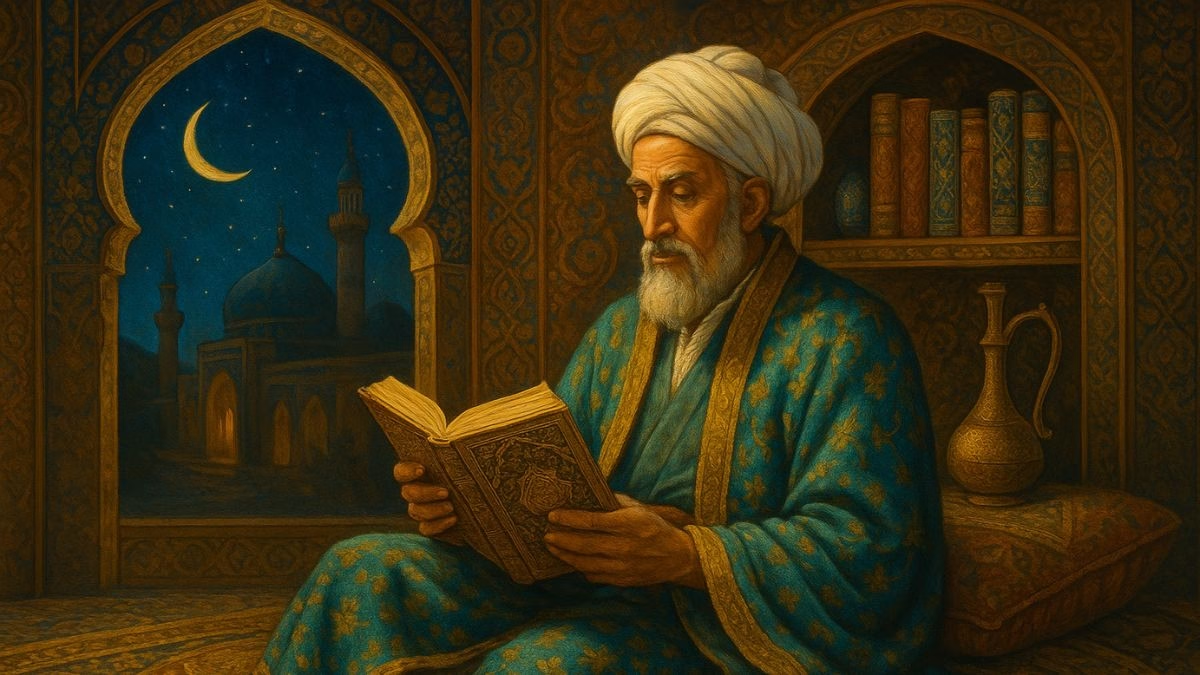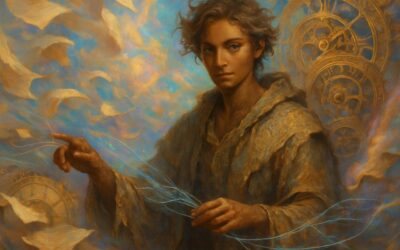There’s a popular idea that after the fall of the Roman Empire, the lights went out across the world. That Europe entered a long, slumbering “Dark Age” where culture, science, and literature were largely forgotten, waiting for the Renaissance to come along and flip the switch back on. But that’s only one part of the map. While Europe was indeed navigating a period of fragmentation and upheaval, another part of the world was blazing with a brilliant, unprecedented light.
From the 8th to the 14th centuries, the Islamic world, stretching from Spain all the way to India, was the global center of culture, innovation, and intellectual life. Its great cities—Baghdad, Cairo, Córdoba, Isfahan—were home to vast libraries, pioneering hospitals, and astronomical observatories that mapped the stars. Scholars translated and preserved the works of the ancient Greeks, while mathematicians developed algebra and algorithms. And at the heart of this vibrant civilization was a deep, intoxicating love of language. This was a world where a single book was considered a literal miracle, where a poem could preserve the soul of a nation, and where the act of storytelling could literally save your life.
So, let’s step out of the European timeline and into the bustling bazaars and fragrant courtyards of the Islamic Golden Age. Prepare to hear the divine word, to witness the clash of epic heroes, to drink the metaphorical wine of the mystics, and to get lost in a labyrinth of stories that never seems to end.
The Miracle of Language
Our journey begins with a book that is, for one and a half billion people, much more than a book. It is the foundation of a faith, the blueprint for a civilization, and the undisputed masterpiece of the Arabic language: the Quran.
To understand the literature of the Islamic world, you have to start here. The Quran is the central religious text of Islam, believed by Muslims to be the direct and unaltered word of God, or Allah, as revealed to the Prophet Muhammad in the 7th century CE. The very name, al-Qur’an, means “the Recitation.” This is a crucial clue. It was not revealed as a written text, but as a spoken one. For 23 years, the Prophet Muhammad recited these divine verses, and his followers memorized them, chanting them, their sounds echoing through the deserts of Arabia long before they were compiled into the book we know today. The sound, the rhythm, the flow of the language are not just decorative; they are essential to its power.
Muslims believe in the concept of I’jaz, or the inimitability of the Quran. The idea is that the literary quality of the text—its eloquence, its rhetorical power, its perfect structure—is so sublime that no human being could ever hope to create anything like it. For believers, the language of the Quran is a miracle in itself, proof of its divine origin.It’s not a linear story like a Gospel or an epic. It is a collection of 114 chapters, or suras, arranged not chronologically, but roughly from longest to shortest. Its voice is majestic and commanding. It shifts from sweeping descriptions of divine power and natural beauty, to legal and moral guidelines, to terrifying warnings of the Day of Judgment, to tender parables of the prophets who came before. It is written in a powerful form of rhyming prose called saj’ that gives it a mesmerizing, incantatory quality when recited aloud.
The effect of the Quran on Arabic literature is impossible to overstate. It codified and standardized the Arabic language, becoming the eternal benchmark against which all other writing was measured. It provided the themes, the imagery, the moral vocabulary, and the lyrical rhythms that would echo through Arabic poetry and prose for the next 1400 years. To understand the literature of this world, you must first understand that it all exists in the powerful, sacred shadow of this one, foundational text.
Saving a Language, Forging an Identity
As the influence of Islam and the Arabic language spread, it came into contact with another ancient and proud literary culture: Persia, the land we now know as Iran. After the Arab armies conquered Persia in the 7th century, Arabic became the prestigious language of religion, government, and science. The native Persian language, Farsi, with its rich heritage of pre-Islamic myths and legends, was in danger of being eclipsed.
But a language, and a culture, can be saved. Sometimes, all it takes is one person with a monumental vision. Around the end of the 10th century, a poet from the city of Tus named Ferdowsi put the finishing touches on his life’s work. It was a poem of almost 60,000 rhyming couplets that had taken him over thirty years to complete. He called it the Shahnameh, “The Book of Kings.”The Shahnameh is the national epic of Iran, a colossal work that aimed to do nothing less than preserve the entire history, mythology, and identity of the Persian people in their own language. Ferdowsi gathered the ancient oral tales and written chronicles of Persia’s past, from the mythical creation of the world and the first kings, through the heroic age of legendary warriors, to the historical rulers ending with the Arab conquest. It was a defiant and heroic act of cultural preservation. As Ferdowsi himself famously wrote, “I have labored much in these thirty years, / and I have revived the Persians with this Farsi.” He didn’t just write an epic; he built a linguistic fortress around an entire culture.
Heroes, Monsters, and Tragic Fathers
The Shahnameh is a vast tapestry of stories, filled with heroic kings, beautiful princesses, evil demons, and magical birds. It is Persia’s Iliad and Odyssey combined. But at the heart of this epic are the tales of its greatest hero, Rostam, a warrior of superhuman strength, the Persian Hercules, whose adventures form the emotional core of the book. And the most famous of these stories is one of the most powerful tragedies in all of world literature: the tale of Rostam and his son, Sohrab.
The story goes that Rostam, on one of his journeys, has a brief romance with Princess Tahmina. When he leaves, he gives her a bracelet, telling her to tie it on their child’s arm as a token of his lineage. Years pass. The child, Sohrab, grows into a young warrior of prodigious strength and skill, his one great ambition to find the famous father he has never met.
In a tragic twist of fate, Sohrab joins an army marching against Persia. In the great battle, the two armies agree to let their champions decide the outcome in single combat. The opposing champions are, of course, Rostam and Sohrab, neither aware of the other’s identity. They fight for hours, a titanic struggle between the two greatest warriors on Earth. Rostam is shocked by the young man’s strength.
Finally, using his experience and a moment of trickery, Rostam manages to gain the upper hand and plunges his dagger into Sohrab’s side. As the young hero lies dying, he speaks with sorrow of how his father, the mighty Rostam, will surely avenge his death. He then shows Rostam the bracelet on his arm.
The moment of recognition is shattering. Rostam lets out a cry of such anguish that the entire battlefield falls silent. He has killed his own son. The grief is absolute and all-consuming, a father’s lament that echoes the great tragedies of Sophocles. It is a timeless, heartbreaking story about fate, identity, and the devastating consequences of war. Through stories like this, the Shahnameh did more than save a language; it gave a nation its soul.
When the Poet is a Drunkard for the Divine
While Ferdowsi was chronicling the glorious deeds of kings and warriors, another kind of literature was developing, one that was concerned not with earthly kingdoms, but with the inner kingdom of the soul. This was the poetry of the Sufis, the mystics of Islam.
Sufism is a path of spiritual devotion that seeks to go beyond the formal rules and rituals of religion to achieve a direct, personal, and ecstatic experience of God. For the Sufis, God was not just a remote, all-powerful judge, but an all-encompassing presence of love and beauty, a “Beloved” with whom the soul desperately longed to unite.To express this intense, ineffable longing, the Sufi poets developed a brilliant and daring set of metaphors: the language of earthly love and wine. In their poems, the “Beloved” is God. The “wine” that brings ecstasy and destroys the ego is divine knowledge. The “tavern” is the monastery or spiritual circle where this divine wine is served. The “cupbearer” might be the spiritual master or God himself. This created a poetry of incredible richness, a poetry that could be read as a sensual ode to a human lover, or a profound hymn of spiritual yearning, or both at the same time.
Rumi and the Dance of the Soul
The most famous master of this mystical poetry is Jalal al-Din Rumi, a 13th-century Persian scholar and theologian whose life was turned upside down by love. Rumi was a respected, sober academic until he met a mysterious wandering dervish named Shams of Tabriz. The two formed an instant, electrifying spiritual bond. Their connection was so intense that it consumed Rumi completely, scandalizing his students and family.Then, one day, Shams vanished—likely murdered by Rumi’s jealous followers. Rumi was shattered. His grief and his desperate, burning longing for his lost spiritual soulmate unleashed a torrent of creativity. He began to compose thousands upon thousands of verses of passionate, ecstatic poetry. He whirled in a dance of grief and love, a practice that would later be formalized by his followers into the famous ceremony of the Whirling Dervishes.
Rumi’s poetry is the sound of that dance. It’s not a quiet, contemplative poetry. It’s a poetry of movement, of passion, of the soul’s burning desire to break free from the cage of the self and dissolve into the infinite ocean of the Beloved. As he wrote:
“I am not from the East or the West, not out of the ocean or up
from the ground… I have put duality away, I have seen that the two worlds are one;
One I seek, One I know, One I see, One I call.”
It’s this universal message of love and unity that has made Rumi one of the most widely read and beloved poets in the world today.
Hafez and the Riddle of Love
A century after Rumi, the city of Shiraz in Persia produced another poetic genius, a man considered to be the absolute pinnacle of Persian lyric poetry: Hafez. Where Rumi’s poetry is a rushing river of ecstatic emotion, Hafez’s is a perfectly cut diamond, sparkling with wit, beauty, and dazzling ambiguity.Hafez was the supreme master of a poetic form called the ghazal. His poems are often about love, wine, and the beauty of nature, but with Hafez, nothing is ever that simple. A line celebrating a glass of Shiraz wine and the glance of a beautiful beloved could be a literal celebration of earthly pleasures. Or it could be a Sufi metaphor for divine ecstasy. Or, very often, it could be a sly, witty critique of the religious hypocrites who preach piety in public while indulging in secret.
Hafez’s genius is that he holds all of these meanings in perfect balance. His poetry is a shimmering, multi-layered thing, a riddle that delights in its own complexity. He is both a hedonist and a mystic, a lover and a sage. This richness has made him the most beloved poet in Iran. His collected works, the Divan, are found in nearly every Iranian home. For centuries, people have practiced fal-e Hafez, a form of divination where they close their eyes, ask a question, and open the book at random, believing the verse they land on will offer them guidance and wisdom. For the Persian people, Hafez is not just a poet; he is a friend and a trusted oracle.
Scheherazade’s Gambit
Our final stop in this world of stories is not a single book by a single author, but a sprawling, ever-changing, and utterly enchanting collection that has captivated the world for centuries: One Thousand and One Nights, known in English as The Arabian Nights.
This is not a sacred text or a national epic. It is a glorious, messy, and magnificent melting pot of popular entertainment. Its origins are a puzzle, a collection of stories gathered over hundreds of years from sources across Persia, Iraq, India, and Egypt, all woven together by one of the most brilliant narrative devices ever conceived.
It begins with a brutal premise. The Sassanian king, Shahryar, discovers his wife has been unfaithful. Mad with rage and betrayal, he has her executed. He then decides to take a new virgin bride every single night, only to have her beheaded the next morning, before she has a chance to dishonor him. Soon, the kingdom is running out of eligible young women.
This is when the vizier’s daughter, the brilliant and brave Scheherazade, devises a plan. She volunteers to marry the murderous king. On their wedding night, with her younger sister present, she asks the king if she can tell one last story. The king agrees. Scheherazade begins a gripping, captivating tale. But just as she reaches the most exciting part, the cliffhanger, the sun begins to rise. The king, desperate to know what happens next, decides to spare her life for just one more day.
And so it begins. Night after night, Scheherazade spins her tales, a dizzying web of stories within stories, fables nested inside adventures, romances interrupted by comedies. And night after night, the king postpones her execution to hear the end.
A World on a Flying Carpet
The stories Scheherazade tells are a treasure trove of world folklore. Here we find the adventures of Sinbad the Sailor, with his seven fantastical voyages. Here are tales of jinns and sorcerers, of talking animals and enchanted cities. It’s a world of flying carpets, magic lamps, and hidden treasures. Interestingly, two of the most famous stories we associate with the Nights—Aladdin and the Wonderful Lamp and Ali Baba and the Forty Thieves—were not in the original Arabic manuscripts. They were added in the 18th century by a clever French translator, but have since become inseparable from the collection.
But the true hero of One Thousand and One Nights is Scheherazade herself. Her stories are not just entertainment; they are a form of therapy. They are a weapon against tyranny. With every story she tells, she is educating the king, re-humanizing him, teaching him empathy, wisdom, and morality. The collection is the ultimate testament to the power of narrative. A story, told well, can literally save a life.
After 1,001 nights of storytelling, the king is a changed man. The stories have healed his wounded soul. He pardons Scheherazade, makes her his permanent queen, and they rule wisely together. The storyteller has not only saved herself and the women of her kingdom; she has redeemed the king and restored order to the world through the sheer, inexhaustible power of her imagination.From the divine poetry of the Quran and the nation-defining epic of the Shahnameh, to the ecstatic love songs of Rumi and Hafez and the life-saving tales of Scheherazade, the Islamic Golden Age was a world saturated with the power of the word. It was a crossroads of cultures that not only produced its own dazzling literature but also preserved the knowledge of the past, waiting to pass it back to a reawakening Europe.And it is to that reawakening Europe that we now turn. We will leave the sun-drenched courtyards of Baghdad and travel to the misty, cold, and forbidding landscapes of the early Middle Ages. Our story will take us from the mead-halls and monsters of Beowulf, down into the divine machinery of Dante’s Inferno, onto the universal stage of Shakespeare, and into the mind of the modern individual during the Enlightenment. Join me next time as we begin “Forging a Continent.”
List of Episodes in the Series
The Story of Literature EP1 | The First Scribes: Tales from the Fertile Crescent
The Story of Literature EP2 | Echoes of Olympus: The Greek and Roman Foundations
The Story of Literature EP3 | The Ocean of Stories: Epics and Wisdom of South Asia
The Story of Literature EP4 | The Brush and the Sword: Poetry and Philosophy in East Asia
The Story of Literature EP6 | Forging a Continent: From Beowulf to the Enlightenment
The Story of Literature EP7 | The Soul of the Steppe: The Great Russian Psychological Novel
The Story of Literature EP8 | Magic and Memory: The Boom of Latin American Literature
The Story of Literature EP9 | The Griot’s Legacy: Oral Traditions and Post-Colonial Voices of Africa
The Story of Literature EP10 | The Global Bookshelf: Migration, Identity, and the 21st-Century Story










0 Comments